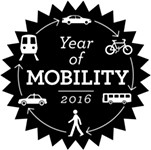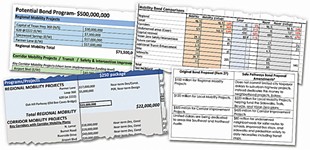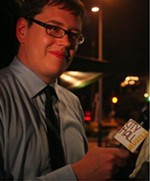City Hall Hustle: Y Don't We Do It in the Road?
November bond proposal creates plenty of opportunity for grumbling
By Wells Dunbar, Fri., Aug. 13, 2010
The bond package – a foregone conclusion judging from the massive board and commission rounds the package made, as well as the mayor's unflagging enthusiasm – received a motion for approval from Sheryl Cole, who, as chair of council's Audit and Finance Committee, had taken the lead in scrutinizing it. "There was a point where Mayor Leffingwell and I were supposed to arm-wrestle," she said, but she noted she had finally grown "comfortable with the financial prudence of taking this action now."
Cole later told the Hustle that the addressing of two issues earned her support: "First, being clear that the bond election does have long-term property tax impact, and second, being clear that just because we're doing the transportation bond now, we're still planning to do a more comprehensive package in 2012."
Leffingwell also spoke in support, obliquely referencing some of the package's more controversial aspects – the Lady Bird Boardwalk project, and other nonroad-related spending (sidewalks, bike lanes, trails, etc.). Saying it was "the most specific bond proposition that we've had, certainly, in my memory," he added, "because of that specificity there's been a lot of discussion. ... A lot of people like this item, don't like that item. I'm one of those people," he said, but argued, "it hits the important elements."
Other council members directly addressed the boardwalk: Laura Morrison took on the argument to defer completion of the boardwalk until it's funded in the 2012 bond, saying the "realities of fundraising" – namely, money being raised by the Trail Foundation – would make that impossible. Bill Spelman concurred, then pivoted back to the broader issues, calling the package a "model of transparency. ... You know exactly what you're gonna get. ... I don't agree with every one of those projects, but that's OK," he continued, saying the itemization of projects allowed him – and presumably voters – to make an informed choice on the overall package. Ultimately, the motion setting a vote for November passed unanimously.
Despite the council kumbaya, off the dais there were signs of discontent, namely among the pro-road crowd clamoring for a different-looking ballot, and the restless natives of Oak Hill.
Before the item passed, Leffingwell, "for the record," called on city staff to address a largely rhetorical issue. "It's been suggested we talk about breaking this proposal into two ballot items – one for roads, and one for alternative [means of transportation]," he said. Said suggestions seem to fall into two arguably overlapping camps: that transportation spending could be better used on roads (the $14.4 million price tag of the boardwalk being an especially sore spot), and that a vote should be allowed on separate projects instead of the $90 million whole. Council watcher Mike Levy decidedly falls in the latter camp, telling the Hustle that bundling the bonds "inherently violates the tenet that citizens have a right to go to the polls where they will have an opportunity to express their will as to separate priorities. It is simple to break items out into separate propositions. ... It's like treating the folks out in Voterland as children: 'We'll give you some of the candy you have been asking us for, but we're not telling you what else you're getting with the candy.'" There are rumors of a potential lawsuit asking the city to break up the bonds, but the legal department's response to Leffingwell's query about breaking up the proposal – a statement from the attorney general's office describing the ballot language as consistent with the city's previous mobility bond elections – might douse that flame.
Also of interest was a declaration from Cole prior to the vote: "I wanted to emphasize that we expect all the money that is currently allocated in the projects to be spent on those projects," she began. "I have received some special concerns about the Y at Oak Hill. There's no reason to expect that this council expects to do anything different at the Y," or in any other project, she said. Oak Hill Association of Neighborhoods President Sandy Baldridge is one of those concerned. She's worried about a study examining potential "continuous flow intersections" at the Y that won't be ready until after the bond election; if "the feasibility study comes back unfeasible," Baldridge says, she's nervous that traffic improvements at the Y might get scrapped. That prompted her to ask council members "that any money designated for Oak Hill would stay in Oak Hill." She says that, aside from Cole, council has "moved on to other things, like the budget – right now, it just is what it is, but I'm disappointed."
All this fun, and we're just getting started. I can't wait until 2012!
Boardwalk your way to the Hustle's weekly recap at austinchronicle.com/newsletters.
Got something to say on the subject? Send a letter to the editor.










